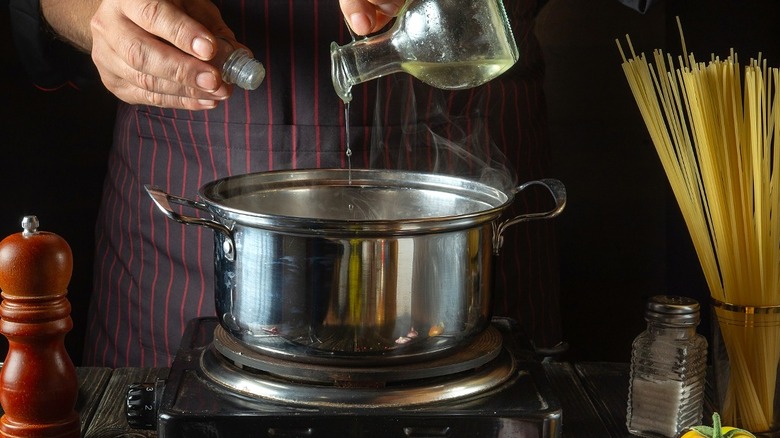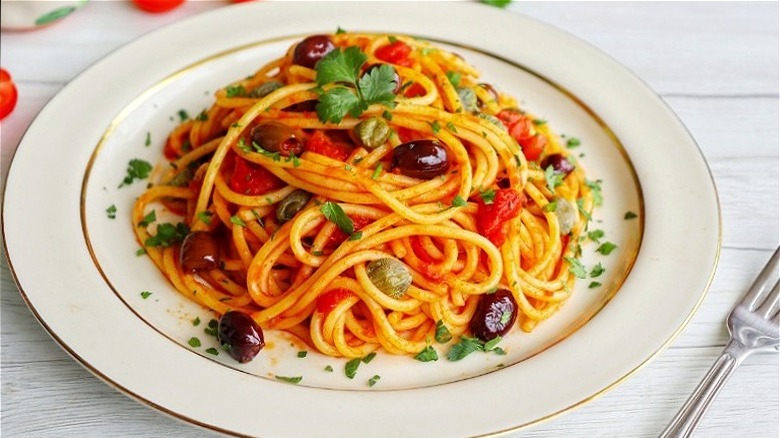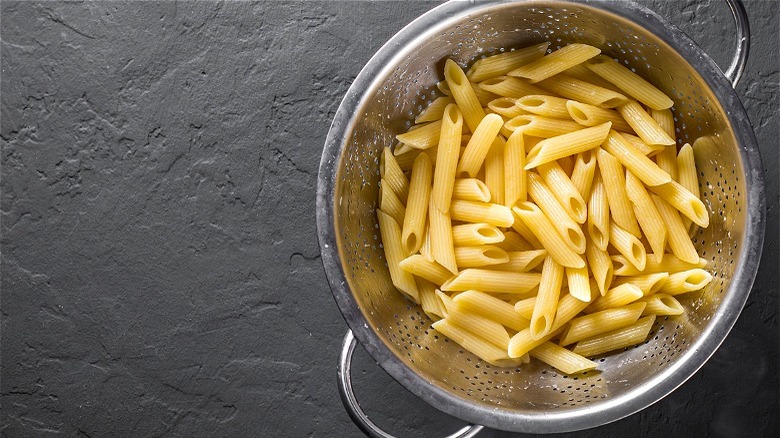Why You Should Avoid Adding Oil To Pasta Water
Most people love a hot bowl of pasta, but no one enjoys spending precious minutes in their kitchen and winding up with a failed dish based on a recipe misstep (or two). Share the Pasta claims the average American eats 20 pounds of it every year, so knowing the secrets behind cooking perfect pasta is most likely essential to your taste buds' happiness.
The necessary steps in pasta preparation vary depending on the method you're following. Unless you want a tasteless meal, Martha Stewart recommends adding one tablespoon of salt per gallon of water when boiling noodles. The celebrity chef claims salt in pasta water adds a unique depth of flavor that a simple sprinkle of salt before digging in can't achieve alone.
In regards to how much water is necessary to cook pasta, chef Lidia Bastianich suggests using at least four to six quarts of water for every pound of pasta (per Today). However, The New York Times was able to prove an abundance of cooking water is not necessarily crucial in achieving evenly cooked noodles. Whether you decide to use a lot of water or less than the standard amount, do you typically add oil to it? If so, you may want to think twice.
Added oil prevents the sauce from sticking to the pasta
If you've been adding oil to your pot of pasta water, this could be the reason why you can't quite get that tasty sauce to coat your finished noodles properly. According to Smithsonian Magazine, since oil is made up of hydrophobic molecules and water is denser than oil, the added oil forms a layer of separation at the top of your pot, untouched by your noodles until drained. When the noodles are poured into a colander, the residual oil washes over the pasta, leaving a thick layer of unnecessary fat. This is problematic if you've been putting in that extra time to create a perfectly hearty pasta with Bolognese sauce.
While the Olive Oil Source claims added oil prevents hot water from boiling over, Smithsonian Magazine advises that when it comes to adding oil to pasta water, the cons outweigh the pros. Barilla agrees, claiming oil makes noodles excessively greasy and doesn't truly prevent noodles from sticking together.
Exceptions to the rule
If you're feeling low thinking you've been cooking pasta wrong your entire life, there are a few instances where added oil has no effect on the outcome of your final dish. In fact, there's one circumstance that additional oil can be helpful. Professional chef and restaurant owner Michael Easton believes oil in a pasta pot does prevent boil-over, but it's only necessary when preparing noodles with a longer cook time, like rigatoni (via Insider).
The only time oil has no effect on your final product is if you're not adding a sauce. If you simply plan on adding parmesan cheese, some form of protein, and a little additional salt, the oil will have a neutral effect on the prepared dish (per Smithsonian Magazine). If you're not sure which kind of noodles to choose based on the selected add-ons, The Food Network lays out pasta pairings for every type of sauce, such as the best noodles for Fettuccine Alfredo.
If you're still worried that your pasta will stick together if you don't add sauce directly after draining, Easton told Insider that adding a small amount of butter to cooked pasta will help any sauce adhere to noodles without sliding off. The anxiety-induced decision-making can be tough when it comes to keeping your beloved pasta safe from potential cooking mistakes. The next time your dinner plans include noodles, try no oil in your cooking pot and judge the results for yourself.


